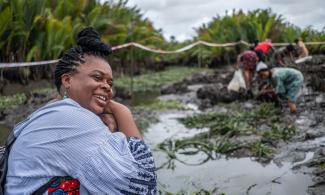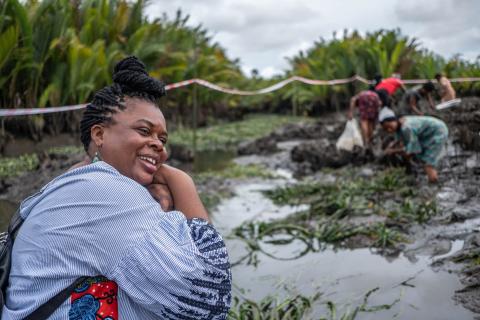
Spills from the company are responsible for wiping out many areas in the Niger Delta region with women the worst hit.
Martha Agbani, a 46-year-old Nigerian activist, is helping communities whose lands and mangroves were destroyed by spills from the subsidiary of Royal Dutch Shell, the dominant oil company in Ogoniland.
Spills from the company are responsible for wiping out many areas in the Niger Delta region with women the worst hit.

After two oil spills in 2007 and 2008 killed off thousands of acres of mangrove forests near the village of Bodo, Shell agreed to compensate the community, clean up the oil and replant.
Agbani took the gauntlet to establish a nursery to grow hundreds of thousands of mangrove plants to sell to the company by empowering women of the region in the process.
In Ogoniland, men often go deep-sea fishing, but women traditionally stay close to shore, collecting crustaceans for their thick, fragrant soups or to sell.
But speaking with New York Times, the activist said when there are no mangroves and thus no shellfish to harvest, the women "now depend solely on men.”
Agbani explained that the initiative was aimed at helping women become relevant.
She said, "I need to help my women to stand. Women were always crying. Women were victims of so many things. I need to help my women to stand.
“That over-dependence has been leading to a lot of violence, too. You are there just to serve the man. We have a lot of motivation. We feel they’ve not really understood what it means, restoring the environment.”
Agbani had worked for years for the Movement for the Survival of the Ogoni People, set up in 1990 in response to the environmental destruction of the ecologically delicate area by multinational oil companies.
The activist said she was inspired by her mother and the work of the activist Ken Saro-Wiwa, Ogoniland’s greatest hero, who was executed by the Nigerian government under the military dictator Sani Abacha in 1995.
According to her, she was a teenager when Saro-Wiwa was arrested.
“People were running helter-skelter. Soldiers got into the communities. In Bori, they were shooting. People were on the rampage," she said.
That experience, the activist said, made her want to fight for her people, adding that while there were many organisations focused on the ravaged environment, few looked at the rights of women, who suffered disproportionately from the effects of oil pollution.